Search the Special Collections and Archives Portal
Search Results

Photograph of Shoshone women, Tonopah (Nev.), early 1900s
Date
Archival Collection
Description
Image
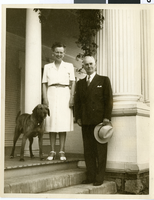
Photograph of Ida and Vail Pittman with their dog, Carson City (Nev.), mid-1940s
Date
Archival Collection
Description
Image
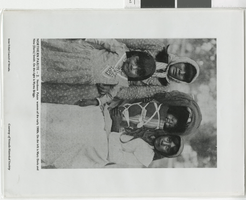
Photograph of Paiute women, early 1900s
Date
Archival Collection
Description
Image

Transcript of interview with Ruth Urban by Barbara Tabach, August 24, 2015 and September 16, 2015
Date
Archival Collection
Description
In this interview, Urban discusses her upbringing in Las Vegas, and childhood friendships, many which came from within the Jewish community. She talks extensively about her professional career and passion for mediation as a strategy for problem-solving. In addition, Urban describes her community service commitments over the years, including her current role with Nevadans for the Common Good. Urban married Andrew Urban Jr. in 1983, and the couple have a son, Andrew Urban III.
Text
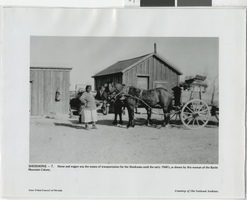
Photograph of a Shoshone woman with her horse and wagon, early 1900s
Date
Archival Collection
Description
Image

Maggie Arias-Petrel interview, May 3, 2019: transcript
Date
Archival Collection
Description
Maggie Arias-Petrel is a successful businessperson and philanthropist. Born in Quito, Ecuador in 1966, Maggie grew up during the Space Age, meeting astronauts through her father’s work as a NASA engineer. Her mother worked as a teacher in an all-girls school. When she was a teenager, Maggie visited her aunt in California and decided to stay in the U.S. She eventually returned to Ecuador and helped her mother run her toy store business, helping her manage multiple locations. Her entrepreneurship flourished as she helped the family business grow into a successful enterprise. Despite the success in her home country, Maggie always dreamed of coming back and living in the U.S. When her family returned, they settled in Las Vegas in 1991. Through her entrepreneurship, Maggie helped many doctors set up their practices, and began her own consulting business, Global Professional Consulting. Today, her expertise includes over 20 years of medical practice management, marketing and advertising for medical and legal, business development and consulting experience. Maggie is also the Chairwoman of the Executive Board of Directors of the Latin Chamber of Commerce of Nevada. She is responsible for changing the direction of the Chamber and helping it become what it is today. She is also the director of the Señoras of Excellence, a philanthropic organization that focuses on raising funds to help Latino students attend college. They have awarded thousands of dollars in scholarship funds to students across the Las Vegas Valley. Because of her work in the medical field, Maggie understands the importance of affordable health care and accessibility. During the Obama Administration, she was part of Senator Harry Reid’s promotion team for the Affordable Health Care Act. She also worked with Governor Jim Gibbons doing international research work in Mexico, and was invited to the White House for the Cinco de Mayo celebration through the U.S. Hispanic Chamber and the Latino Coalition. Maggie is also responsible for the partnership between the Universidad Autónoma de Guadalajara, one of the most prestigious and accomplished institutions of higher education in Mexico, St. Rose Dominican Hospitals, and the Nevada System of Higher Education to develop nursing programs with direct collaboration from UAG to increase the number of bilingual-bicultural medical professionals in Nevada. She is the director for the Workforce Connections of Nevada Board and the Dignity HealthCare - St. Rose Dominican Hospital Board of Directors. Maggie has also received numerous accolades and awards such as the Community Service Award from the Latin Chamber of Commerce, Señoras of Excellence Award given to woman who excel in their professions, the Excellence in Advocacy Award by The Colors of Lupus Foundation, and the “Woman in Business” Award by the National Coalition of 100 Black Women. In 2011, she was named one of the ten most influential Hispanics in the city by the Las Vegas Business Press. She is also one of the community leaders featured in the Las Vegas Latino Leaders Inaugural Edition Book. Maggie attended Los Angeles Mission College and Central University of Ecuador. She lives in Green Valley with her two sons.
Text
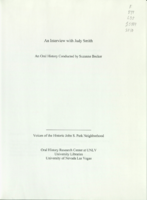
Transcript of interview with Judy Smith by Suzanne Becker, November 22, 2008
Date
Archival Collection
Description
Judy Smith was a teenager when her family relocated from Barstow, CA to Las Vegas in 1958. It was a wide open setting, an ideal location for riding her horse. It was also an era of growth as the city became a gambling destination and the Strip became dotted with early casinos and hotels. Judy attended Las Vegas High School, worked for the Las Vegas Sun and earned a scholarship to UNR. By 1967, she was married and moving back to Vegas with her young family. They chose the John S. Park Neighborhood as the place to call home. For Judy living in John S. Park is about a "sense of place" and "a sense of timelessness." She describer the evolution of the neighborhood and the greater Las Vegas community from the pioneers to the contemporary leaders. In 2006, Judy's home was gutted by a fire. Her life was saved by an observant neighbor. She could have relocated at the time, but chose not to move from the area that she has called home for over 40 years.
Text
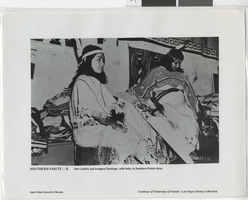
Photograph of Southern Paiute women, early 1900s
Date
Archival Collection
Description
Image

Transcript of interview with Nancy Houssels by Caryll Batt Dziedziak, November 18 & December 14, 1998
Date
Archival Collection
Description
What is the importance of dance? For Nancy Claire Houssels, it has simply shaped her life! Born on February 26, 1935 to Edith Darlene Wallace and William Edwin Wallace, Nancy grew up with three brothers in an athletic household in Piedmont, California. She began dancing at the early age of three and filled her childhood years with dance and synchronized swimming. After attaining a Bachelor of Arts Degree in Theatre Arts from UCLA in 1957, Nancy went on the road with the Hollywood Bowl; soon meeting her future dance partner, Francois Szony. Already known as one of the most respected adagio dancers in the world, Szony would become Nancy’s dance partner for the next ten years. The Szony and Claire adagio team rehearsed in New York City before heading off to their first European engagement at the London Palladium. The team spent the next few years appearing in London, Copenhagen, Paris, Vienna, Rome, Turino, Milan, Barcelona, and even Beirut. Their physical ability to perform breath-taking spins and lifts appealed to broad audiences; even those with little or no appreciation of ballet. After returning to the states, Szony and Claire performed in Miami, Puerto Rico, and throughout New York; including Radio City Music Hall, the Ed Sullivan Show, Carnegie Hall, and Madison Square Garden. In 1966, the dance team headed to Las Vegas, Nevada to appear with the Casino de Paris at the Dunes Hotel. Shortly thereafter, in 1968, Szony and Claire joined the cast of the Folies Bergere at the Tropicana Hotel. In May 1970, Nancy married J. Kell Houssels, Jr., then the President of the Tropicana Hotel. As Nancy likes to retell this moment, “Well, my husband fired me and we got married!” After more than thirty years of dancing, Nancy felt ready to end her professional dance career and looked forward to starting a family. Nancy and Kell subsequently had two children: Kelly Clair and Eric Wallace, and Nancy happily ‘inherited’ three stepchildren: Josh, Jake, and Leslie. The adjustment of shifting from a career characterized by a grueling work schedule to that of domestic life proved challenging for Nancy. She soon began looking for ways to involve herself in the community. Since the early 1970s, Nancy has lent her time and support to such diverse entities as Child Haven, Children’s Service Guild of the Clark County Juvenile Court System, National Conference of Christians and Jews, PBS Friends of Channel 10, Nathan Adelson Hospice, Meadows School, United Campus Ministry, Las Vegas Metropolitan Beautification Committee, McCarran Airport Arts Advisory Committee and the University of Nevada, Las Vegas Foundation. While Chair of the Nevada State Council of the Arts for seven years, she proved instrumental in establishing a Folk Arts program and expanding legislative funding for statewide arts programs. Nancy’s service to the community has been recognized with such awards as the 1985 Nevada Dance Theatre’s Woman of the Year, the 1988 Governor’s Arts Award - Distinguished Service to the Arts, the 1994 State of Nevada’s Women of Achievement, and the 1997 We Can, Inc.’s Chris Schaller Award for children’s advocacy. Although her days as a professional dancer had ended, Nancy never relinquished her love of dance. In 1972, Nancy joined Vassili Sulich in founding the Nevada Dance Theatre. As the principal dancer in the Folies Bergere, Sulich had organized a series of dance concerts for the Las Vegas community. Much to Nancy’s surprise, the Las Vegas community responded enthusiastically to the availability of ballet performances. Nancy quickly formed a volunteer board to raise the critically needed funding for this endeavor. She began with an evening fundraiser at her home, inviting a group of like-minded friends. This effort raised the initial fifteen thousand dollars that set the Nevada Dance Theatre on its way. In 1976, the company acquired its non-profit status and subsequently formed an academy to train children in dance. Nancy played an instrumental role in furthering the ballet company’s community outreach; creating such programs as Future Dance funded by the Lied Foundation. This program targets lower income children who attend at-risk elementary schools and provides them with free dance instruction…building self-esteem, confidence, and hope. In 1996, with a capital grant from the Donald W. Reynolds Foundation and land donated by the Howard Hughes Corporation, the Nevada Dance Theatre began drawing their plans for a world-class facility in Summerlin. Completed in 1999, the company now had a visible home within the Las Vegas community. Here, students from the Las Vegas community trained alongside the company’s professional dancers. Renamed in 1998 as the Nevada Ballet Theatre and with a new Artistic Director, Bruce Steivel, the Company continues to serve not only as a leading force for live performing arts, but also as a source of community outreach programs for children. Nancy continues to remain involved with the Nevada Ballet Theatre and currently serves as the Co-Chair of the Company. She believes her life experience reflects both the viewpoint of the artist and that of the audience. Indeed, her visionary leadership and love of dance has not only shaped her life but has nurtured the development of the cultural arts in Southern Nevada.
Text
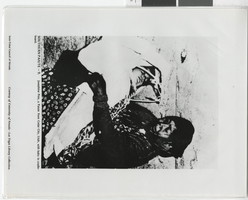
Photograph of Josephine Pete with baby, early 1900s
Date
Archival Collection
Description
Image
